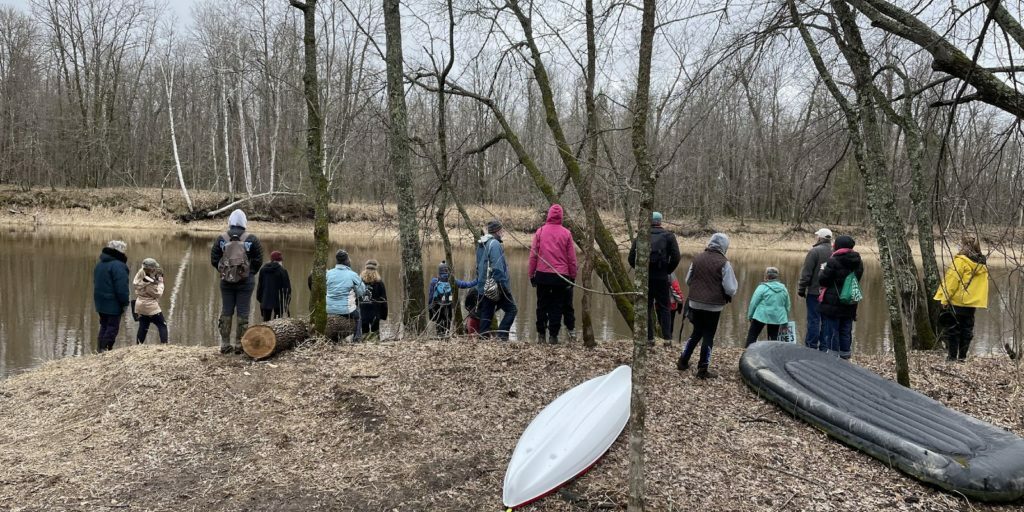Being at the Water Protector Camp
This reflection was written by Barb Patterson, a member of Edina Community Lutheran Church (ECLC), following a trip to Palisade on April 17, 2021.
Dick and I left the Twin Cities under gray skies on Saturday to drive to the Water Protector Camp, Mississippi House, near Palisade, MN. This would be our second visit to the Camp at the invitation of our Mission Partner, MNIPL and the Water Protectors, and we were to meet Diann, ECLC EcoFaith Chair there. It was a pleasure to drive north, and see eagles, deer, crane, and even a grouse skittering across the road. Drainage ditches along the road are full of the spring melt, and spring peepers made their gentle spring sound.
We were joining 25-30 folks from several faith communities (First Congregational, St. Joan of Arc, Edina Morningside, Lyndale UCC, and Holy Trinity Lutheran) plus other neighbors who live nearby for a visit led by MNIPL leaders Kristen and Johannah. We were there to connect, learn, and pray.
Connecting
Gathering around the campfire as we waited for others to arrive, I was struck by the changes I noticed since the last time I had been in Camp in early February. Boards, straw and wood chips helped protect the sodden earth and kept us out of the mud. Wood fires were still there for warmth, and I noticed more tents in addition to the yurts where people have slept all winter. The camp food tent was still there, though now it has been raised, and the outdoor station for washing dishes has a large tank for water.
I joined a group gathered around an enormous caldron, and learned that birch sap was boiling-off for a healing medicine. A smudging ceremony passed around the group, and I felt thankfulness and calm as the healing smoke of the cedar wafted over me.
Water Protector Joe told us a bit about the Camp: that it is founded as a non-direct action Camp; there is an emphasis on prayer and art; that this is an Indigenous women-led movement. We should obey Camp rules and respect the movement.
After a brief introduction by Kristen, we took turns introducing ourselves with why we were there that day. Participants from teens to seniors spoke passionately about Stopping Line 3, their desire to protect water, to learn, to stand for Indigenous rights, and that joining together is a powerful force. Others acknowledged their personal settler history, and spoke of their purpose of being present to begin small acts of repentance and reparation.
Learning
Water Protector Shanai Matteson, artist and writer, descendant of settlers, spoke powerfully of growing up in and returning to the Palisade area, and of her commitment to healing and finding a new way to live in community and not relying on economies of extractive industry: to live with the land and search for a new way of being.
As we walked a short distance to the area near the pipeline construction, hearing singing helped me connect to this as pilgrimage and a holy witness. We saw the corridor of cut forest and the wooden drill pad for heavy equipment, built adjacent to the Mississippi River, in preparation for the HDD (Horizontal Directional Drilling) under the water, which cannot take place right now under the wet melt conditions. Just beyond the drill pad is an Anishinaabe prayer lodge (referred to by Enbridge as a “cultural artifact”), built by Water Protectors Winona LaDuke and Tania Aubid. It is all that stands between this area of destruction and the River. This area is one of two places that Enbridge will place pipes under the Mississippi River, which is drinking water for 18 million people. Opposite the drill pad, we could see the security trucks of the Company hired by Enbridge to guard this area of construction. A security guard got out of his vehicle to close the gate to block our view, but the gate was stuck, and it wouldn’t close.
Johanna spoke powerfully about why we want to Stop Line 3: the tar sands oil transported from Canada is some of the dirtiest oil that requires the most refining, and will not be used by the people of MN, but shipped abroad; pipelines inevitably leak, which will endanger wild rice land that is protected by Treaties and will threaten drinking water; Line 3 is very similar to Dakota Access Pipeline (length, type of oil, same company); the pipeline provides very few local jobs. We also learned about the banks that support the building of the pipeline and the Defund Line3 movement. A Florida-sized portion of the slow-growing boreal forest in Canada has already been destroyed for oil extraction.
Shanai told a story about bringing her 90 year-old grandmother back to see the area, and how painful it was for her to see areas of destruction. We heard other stories of the division in the local community over Enbridge and the pipeline, and the tremendous cost of security. (This article highlights some of those community divisions.)
As we stood by the road (out of the right of way), two SUVs came barreling by another truck spewing exhaust. They did not slow down or pause as they raced by us. Was it intentional? Was this a message? I felt a moment of invisibility. Would they like to imagine that no one stands there, on the side of the road, witnessing?
Prayer
Kristen led a prayer of the body which helped me to feel joined with the place and gave me strength and encouragement to continue standing against the pipeline: Reach up to the stars and join with creation; feel your heart beating and find power within you; touch the ground and draw strength from the earth; reach your arms out to say ‘Stop!’
As we proceeded to the path that would take us down to the edge of the Mississippi River, we walked past a small tree, decorated with strips of blue cloth, reminding me of the silent passage of water deep below where I was standing, water that was making its way to the River, and water that needed protecting. I later learned that these are prayer-strips, created by students with words of things they love, and fear will be lost to Climate Change. A new art-sign has appeared at the trailhead, proclaiming: Down to the River to Pray, and I am reminded of the power of art and music as tools of strength in the face of injustice, and I feel gratitude for those who made it.
Through a wooded glen and down a muddy hill-path toward the Mississippi, we took time to marvel at the amazing growth of thick moss on tree trunks, listen to the trickling water of a stream, and smell the damp earth awakening. Additional tents and sleeping structures dotted the path. Helpers stood ready to lend an arm for balance as we stepped over tree trunks, and negotiated our way around wet areas.
While we were gathered at the River, there was silent time to just be present and hold space, and I was struck by how often I take water for granted. Even though my own body is mostly water that I must daily replenish, and even though I have clean water at my fingertips, I seldom think about water. I took a moment to silently wonder how far this particular water had traveled to be in that place, and I took time to say thank you to the Creator and the Water and to feel the Presence of the Holy. I listened to the gentle trickle of the Water stream just before it joined the body of the Mississippi.
Near the River’s edge, stories were invited, and two clergy shared: the first story related the additional meaning behind when Jesus called the disciples from the Sea of Galilee, and asked them to put down their nets and follow him. The part of the story that we have seldom heard is the background of oppressive taxation by Rome, and how the fish from that sea were feeding the soldiers of Rome. By asking the disciples to leave their nets, Jesus was asking them to move toward the radical decision to stop supporting the Empire.
Secondly, we heard a bit about the Doctrine of Discovery, and how the Church has supported oppression and killing of native peoples for centuries. As we become aware of this history, we can choose a different path and make a way of repentance, reparations, and healing.
We sang songs about the water and healing, including the Nibi song.
We made our way up the hill and returned to the campfires to visit and talk about our experience while we ate a picnic lunch. I got an update from the person who is doing all the cooking for the Camp: they now have freezers to help keep food fresh, and they receive re-supplies easily through a network. This caused me to reflect on how many people with differing talents and resources are coming together in this movement to StopLine3.
Whether you are donating funds to frontline workers, praying, cooking/donating food, showing up to march, talking to your neighbor, writing to Pres. Biden and Gov. Walz, or even searching the internet to educate yourself, thank you for doing what you can to StopLine3. It’s going to take all of us to do this work.
We can’t all visit Camp, which is why I wanted to write this. When I reflect on my trip to Camp and why I went there, I see that gathering with others to connect, learn, and pray gives me strength and encouragement to keep going in the Journey to Justice. Together we will StopLine3.

